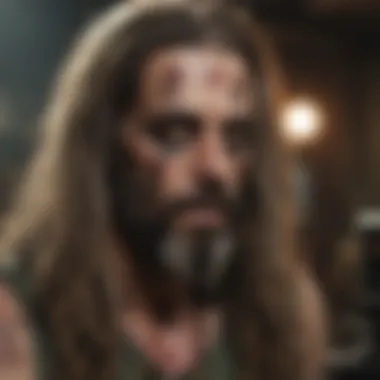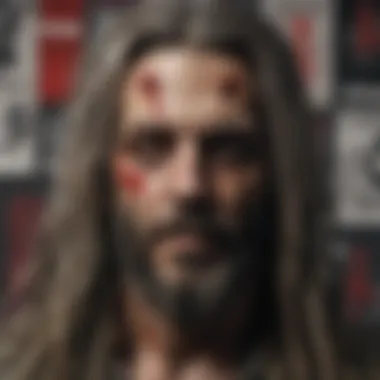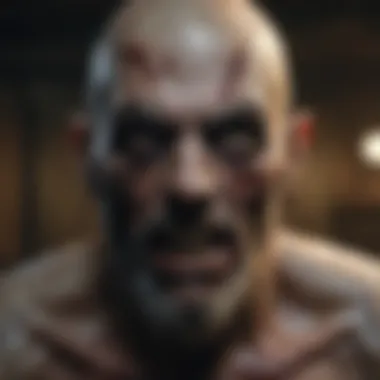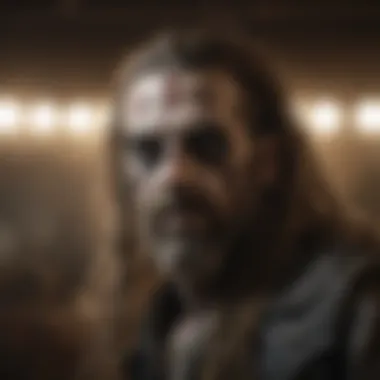Exploring Rob Zombie's Unique Cinematic Landscape


Intro
Rob Zombie stands out as a provocative filmmaker in the horror genre. With a career that spans music and visual arts, his unique perspective influences every aspect of his films. This analysis aims to uncover the layers of his cinematic contributions. By looking at specific films and recurring themes, one can better understand his impact on contemporary horror and film as a whole.
Zombie's journey began in music, which amplifies his films' auditory experiences. He translates his understanding of spectacle into his visuals. This fusion lays the groundwork for his distinctive directorial style. Notably, his narratives often explore the darker side of humanity. They dive into themes such as family, violence, and the grotesque.
While some critics regard his work as divisive, there's an undeniable cultural footprint he has left. His interpretation of horror goes beyond mere shock value. It often challenges societal norms and expectations, contributing to larger discussions within the genre.
In this comprehensive analysis, we will assess various facets of Rob Zombie’s cinematic contributions. Expect to explore his filmography, motifs, audience reception, and how his artistic background informs his style. Each component presents opportunities to delve deeper into a filmmaker who marries music, visual art, and horror in a truly distinct manner.
Rob Zombie: An Preface to His Cinema
Rob Zombie emerges as a significant figure in contemporary horror cinema, bridging diverse artistic realms. Understanding his cinema is essential for acknowledging how his unique style and thematic choices contribute to the genre. Zombie's films often reflect his intense worldview, shaped by his background in music and visual arts. Through his work, he cultivates a distinct atmosphere that challenges conventional horror tropes.
His movies do not just aim to terrify; they explore depth in character and story. This section examines various factors that make Rob Zombie's contributions noteworthy. By addressing the following aspects, we can appreciate the unique imprint he has left on the landscape of modern horror.
- Narrative Techniques: Zombie's storytelling often intertwines complex characters and dark, intricate plots.
- Visual Presence: His attention to detail in set design and cinematography enhances the overall viewing experience.
- Cultural Commentary: Numerous themes in his films reflect societal issues, contributing to a layered understanding of the horror genre.
This foundation serves to frame Rob Zombie not merely as a filmmaker but as a cultural commentator. His works invoke discussions about violence, family dynamics, and the impact of societal decay. As we delve deeper into the framework of his cinema, we uncover its implications on audiences and the genres narrative structure.
Biographical Context
Born Robert Bartleh Cummings in 1965, Rob Zombie's upbringing played a critical role in shaping his creative vision. Growing up in Haverhill, Massachusetts, he was influenced by a swirl of horror movies, comic books, and music, particularly heavy metal. These interests permeate his films, evident in the graphic violence and offbeat characters that populate his narratives.
Zombie's early career in entertainment began with the band White Zombie, which achieved significant success in the early 1990s. The band's music often contained horror-themed elements, providing a seamless transition into film. Understanding his biographical context enables us to see the origins of his artistic direction and the recurring motifs across his body of work.
Transition from Music to Film
Rob Zombie's transition from music to film may not seem typical, but it reflects his multifaceted creativity. After establishing his music career, he directed music videos that displayed a flair for coalescing audio and visual elements. This paved the way for his debut feature film, House of 1000 Corpses, which debuted in 2003.
His music background contributes to his storytelling. The understanding of rhythm and pacing in music resonates within his films. For example, he often employs sound cues to heighten tension or provide a sense of unease. Soundtracks play a vital role, often featuring tracks that complement the film’s emotional undertones.
Though he faced challenges in gaining recognition as a filmmaker, Zombie channels his experiences in music into creating unique narratives and characters. This transition exemplifies that creativity can span across various mediums, allowing for a richer artistic expression.
Thematic Elements in Rob Zombie's Films
Rob Zombie's films present a complex tapestry of themes that exceed the traditional boundaries of the horror genre. Understanding these thematic elements is crucial for analyzing his filmography as they illuminate his unique perspective on storytelling. From brutal representations of violence to deep explorations of family and societal dysfunction, Zombie's films engage viewers on multiple levels. These themes not only reflect his artistic intent but also resonate with audiences, provoking thought and evoking strong emotional reactions.
Exploration of Violence
One of the most prominent themes in Rob Zombie's work is violence. His films often depict humanity in its rawest form, showcasing brutal acts that challenge viewers’ perceptions of morality. Violence serves multiple purposes within his narratives:
- It creates a visceral response, placing the audience directly in the chaos of the storyline.
- It reflects the darker aspects of the human condition, questioning societal norms and beliefs.
- This theme often mirrors Zombie's own musical background, where shock value and extremity are prevalent.
In movies like House of 1000 Corpses and The Devil's Rejects, Zombie utilizes violence not merely for shock but as a narrative device. It functions as a commentary on the culture of fear and entertainment violence present in modern society. Furthermore, the grotesque presentation challenges viewers to confront their own desensitization to brutality, making it a central pillar in his storytelling approach.
Family Dynamics and Dystopia


Family dynamics in Rob Zombie's films are often marked by dysfunction and chaos. His portrayal of family is far from idealized; instead, it reflects fragmented relationships and disturbing power dynamics. In The Devil's Rejects, for example, the characters are bound not just by blood but by shared experiences of trauma and violence. This particularly highlights how destructive forces can shape familial bonds.
The theme of dystopia runs parallel to these familial explorations. Zombie embeds a sense of hopelessness in his worlds, dominated by oppressive environments and moral decay. These narratives often suggest that the family unit, rather than being a source of protection, can also be a place of horror. Thus, Zombie’s films provoke questions about nature versus nurture, suggesting that the circumstances of one’s upbringing can lead to violent outcomes.
Cultural References and Influences
Cultural references play a vital role in shaping the context and depth of Rob Zombie's films. He meticulously weaves elements from various periods and styles of horror cinema, as well as broader pop culture, into his storytelling. This blend serves to create a familiar yet disturbing atmosphere that resonates with fans of horror.
For instance:
- His homage to classic horror films often manifests through visual stylization and narrative tropes.
- References to 1970s exploitation films and the works of directors like Tobe Hooper infuse his films with a sense of nostalgia while remaining forward-looking.
- Zombie's music background also bleeds into his films, creating audiological connections that enhance the viewing experience.
Moreover, by embedding these cultural influences, Zombie invites audiences to explore the evolution of horror and its impact on society. The interplay between nostalgia and contemporary issues creates a richer dialogue within his films and allows for deeper analysis of the genre.
In sum, Rob Zombie’s thematic elements are not merely aesthetics. They provide commentary on violence, familial structures, and cultural histories. Through these themes, he forges a unique path that is distinctly his own while contributing to the greater landscape of cinema.
Rob Zombie's Directorial Style
Rob Zombie's directorial style is a defining aspect of his filmography. It sets him apart in the competitive landscape of horror cinema. Understanding this style is crucial to appreciating his work. Several specific elements contribute to his unique approach: the visual aesthetic, sound design, and music integration. These elements work in tandem to shape the mood and tone of his films, establishing a recognizable brand that is both unsettling and captivating.
Visual Aesthetic
The visual aesthetic in Rob Zombie's films is key to his storytelling. He often employs a gritty and raw imagery that evokes a sense of realism. The color palette tends to be dark and muted, which enhances the horror elements in his stories. This choice of visuals reflects the themes of violence and despair that are prevalent in his narratives.
Zombie frequently utilizes high contrast between shadow and light, creating dramatic visuals that heighten the emotional impact. For instance, in House of 1000 Corpses, the chromatic intensity serves to immerse viewers in an unsettling world, where the grotesque becomes a form of art. Each frame could be seen as a storyboard, capturing the chaotic essence of horror.
Another notable aspect of his visual style is the deliberate inclusion of wear and tear. He showcases settings that appear lived-in and decayed. This choice adds authenticity to the experience of his films. The locations are not merely backdrops but are characters in their own right, contributing significantly to the atmosphere.
Impact of Visual Aesthetic
- Immersive experience: The visuals pull the audience into the narrative.
- Emotionally charged imagery: The aesthetic amplifies the visceral reactions.
- Meaningful settings: Locations enhance plot developments and character arcs.
Sound Design and Music Integration
Sound design is integral to Rob Zombie's films as it complements his visual storytelling. He meticulously curates sounds that reflect the density of the atmosphere. Whether through environmental noises or character dialogues, every sound element plays a role in establishing tension and building suspense.
Music is another critical aspect of his directorial approach. Zombie, coming from a musical background, integrates various musical elements seamlessly into his films. His use of classic rock and heavy metal not only captures the mood but also resonates with his audience. For example, the music choices in The Devil's Rejects create a nostalgic yet eerie backdrop, enriching the film’s emotional landscape.
Through strong sound design, Zombie enhances critical moments. Silence is often used strategically, allowing for a heightened sense of fear before a sudden auditory shock. This technique keeps audiences on edge, preparing them for unsettling surprises.
Importance of Sound Design and Music Integration
- Enhanced emotional depth: Soundtracks add layers to emotional experiences.
- Effective tension building: Strategic sound choices maintain suspense.
- Cohesive storytelling: Music and sound unify the narrative, enhancing immersion.
The combination of visual and auditory elements in Rob Zombie's films creates an experience that is uniquely disturbing yet immensely engaging. His directorial style invites audiences to confront their fears within strikingly crafted realms of horror.
In summary, Rob Zombie's directorial style is a composite of visual prowess and sound mastery. The elements of aesthetic and sound design work in alignment to deliver chilling narratives. This realization is pivotal for understanding his contributions to the horror genre and the immersive storytelling he offers.
A Review of Key Films


In assessing the works of Rob Zombie, examining his key films is essential. Each film serves as a distinct reflection of his evolving vision, thematic interests, and artistry. By looking at these notable projects, one can appreciate the complexity of his storytelling and how it intertwines with his background in music and visual arts. This section highlights the significant contributions of these films to the horror genre and how they resonate with audiences.
House of Corpses
Released in 2003, House of 1000 Corpses marks Rob Zombie's directorial debut. The film is a chaotic blend of horror and dark humor, paying homage to classic horror tropes while introducing original concepts. It follows a group of young adults who fall into the hands of a sadistic family. This family, led by the psychotic Captain Spaulding, represents the depths of depravity and violence.
Zombie's unique visual style is evident throughout the film. The vibrant colors and distorted imagery create a nightmarish atmosphere. The film also utilizes meticulous production design to evoke a sense of dread. House of 1000 Corpses is crucial to Zombie's filmography, setting the tone for his future works and firmly establishing his voice within the genre.
The Devil's Rejects
The Devil's Rejects, released in 2005, serves as a sequel to House of 1000 Corpses. However, it diverges from its predecessor in tone and style. This film showcases a more dramatic and emotionally charged narrative. It follows the murderous Firefly family as they escape from the law, leading to a violent confrontation with a determined sheriff.
The characters are more fleshed out in this film. Rob Zombie explores moral ambiguity, as audiences struggle to sympathize with these ruthless killers. This complexity enhances the film's impact, emphasizing the blurred lines between good and evil. The cinematography is gritty and visceral, enhancing the rawness of the story. The Devil's Rejects is often considered one of Zombie's best works, demonstrating his artistic growth as a filmmaker.
Halloween: A New Vision
In 2007, Rob Zombie took on the iconic franchise with Halloween: A New Vision. This film is both a reboot and a reinterpretation of John Carpenter’s 1978 classic. Zombie delves into the backstory of Michael Myers, providing insight into his disturbed psyche. The film offers a fresh perspective while retaining elements that fans recognize.
Zombie's approach emphasizes violence and brutality, leading to a divided reception. Some praised the film for its daring take on established lore, while others felt it strayed too far from the original’s spirit. Regardless of the opinions, Halloween: A New Vision has sparked discussions about remakes in the horror genre, emphasizing Zombie's role in redefining how classic narratives can be approached.
Lords of Salem
Lords of Salem, released in 2012, marks a significant departure from Zombie's earlier works. This film is more atmospheric and psychological, focusing on a radio host in modern-day Salem who experiences disturbing visions connected to the town's witch trial past. Zombie utilizes a slow-building tension, allowing the horror to unfold rather than bombarding viewers with violence.
The film is rich in symbolism and thematic heft, exploring topics like guilt, trauma, and the power of the past. The visual style is distinct, employing surreal imagery that creates a hallucinatory experience. Critics have noted its ambitious nature, making Lords of Salem a noteworthy entry in Zeombie's filmography, showcasing his versatility as a director.
Three from Hell
In 2019, Three from Hell continues the story of the Firefly family, further delving into their deranged lives after surviving the events of The Devil's Rejects. This film reunites familiar characters and explores their dynamics within confinement and chaos.
Zombie's signature style shines through once again, with an emphasis on character-driven narratives and intense interactions. The film has a sense of nostalgia but also a fresh approach, making it resonate with long-time fans of his work while appealing to new audiences. Critics have highlighted its ability to balance homage with innovation, capturing the essence of Zombie's filmmaking journey.
“Rob Zombie’s films are not just horror; they are commentaries on morality, family, and the human condition.”
Emphasizing key films in Zombie's career illustrates how they form a complex web of storytelling, visual aesthetics, and thematic exploration. Each work contributes to his legacy, providing important insights into the landscape of contemporary horror cinema.
Critical Reception of Rob Zombie's Work
The critical reception of Rob Zombie's projects serves as a mirror reflecting the complex interplay between audience expectations and artistic expression. Understanding this reception is essential, as it sheds light on Zombie's role within the horror genre and contemporary cinema. Analyzing how his films are received can reveal deeper societal attitudes towards horror, artistry, and cultural commentary. This section discusses how the perception of Zombie’s distinct style shapes conversations in film circles and informs the evolution of horror cinema.
Audience Reactions
Rob Zombie's films inspire a wide array of audience reactions. Many fans appreciate his gritty aesthetics and unique storytelling that deviates from traditional horror. For some, his narrative choices resonate with personal experiences or societal fears. The cult following around him emphasizes this point. Fans often engage passionately with his work, leading to discussions on forums and social media platforms like Reddit.
On the other hand, there are detractors who criticize his work as excessively violent or lacking depth. Audience reactions are polarized, which is notable when examining ticket sales against critical reviews. Whether fans regard his films as artful or merely gratuitous often depends on individual perspectives on horror's place in storytelling.
Some key points about audience reactions include:


- Cult following: Fans often create communities surrounding his films.
- Polarized opinions: Reactions can range from admiration to disdain.
- Discussions: Engaging dialogues on platforms like Reddit or Facebook foster community.
Potential takeaways from these reactions show the diversity of horror film appreciation and challenge traditional boundaries within the genre.
Critical Perspectives
Exploring critical perspectives unveils another layer of reception for Rob Zombie's films. Critics often evaluate his work through the lens of genre conventions and cinematic innovation. Many reviewers focus on aspects such as originality and thematic depth. Despite mixed reviews, Zombie's films frequently prompt discussions regarding violence portrayal and ethical storytelling in horror.
Some critics laud his aesthetic choices, citing a deliberate stylization that successfully pays homage to classic horror while crafting a contemporary identity. Conversely, others argue that his preoccupation with violence overshadows any potential narrative depth. This divide demonstrates that opinions about his work remain deeply subjective.
Key points on critical perspectives include:
- Evaluations: Critics assess thematic innovations and visual style.
- Subjectivity: How reviewers perceive violence can greatly influence their scores.
- Genre discussion: His work often sparks broader conversations about horror.
The Impact of Rob Zombie on Contemporary Horror
Rob Zombie's entrance into the horror genre has crafted a distinct place within contemporary cinema. His films illuminate a style that challenges norms and reshapes expectations. Zombie’s unique voice has resonated with audiences, blending nostalgia with visceral horror. This section evaluates the significance of his influence on modern horror and how his vision diverges from traditional conventions.
Influence on New Generations of Filmmakers
Rob Zombie has had a profound impact on emerging filmmakers. His approach is about more than just horror; it integrates his musical roots and visual aesthetics, creating a multifaceted narrative. Many new filmmakers cite him as an inspiration, particularly for his willingness to push boundaries.
Zombie combines various elements: gritty storytelling, shocking visuals, and memorable soundscapes. His films encourage young directors to explore unconventional narratives. You can see his influence in works from directors like Ti West and Adam Wingard. They embrace similar themes of violence and familial strife, hallmarks of Zombie's work.
Moreover, his position as an indie filmmaker makes him relatable to many. He showcases the importance of personal expression in a field often dominated by studio influences. His ability to blend horror with punk music aesthetics illustrates a bridge between music and film. This symbiotic relationship inspires filmmakers to discover their unique voice, integrating distinct cultural influences into their narratives.
Trends in Horror Cinema
The presence of Rob Zombie in contemporary horror cinema has redefined certain trends. Notably, a resurgence of the gritty, character-driven horror film can be traced back to his style. His films often go against the popular polished horror trends and delve into raw, unsettling territory.
The following are some notable trends influenced by Rob Zombie:
- Emphasis on Character Depth: Zombie’s characters often embody complexities and flaws, making them relatable even in their monstrous behavior.
- Grainy Visuals and Realism: His aesthetic choices bring a sense of groundedness, often using grainy textures to evoke past horror films, placing them in stark contrast with sleek modern productions.
- Blending Genres: Zombie is not confined to horror; he incorporates elements of documentary, drama, and music, creating a cross-genre appeal that has affected how horror narratives are crafted.
In summary, Rob Zombie’s contribution to the horror genre goes beyond entertainment. He has become a touchstone for new filmmakers and has influenced trends that prioritize character, realism, and genre hybridization. This legacy continuously shapes the landscape of horror cinema, encouraging future creatives to explore the darker corners of human experience and expression.
The End: The Legacy of Rob Zombie
Rob Zombie's contributions to the horror genre demonstrate a unique melding of his background in music and visual arts. His films are not merely narratives; they embody a distinct aesthetic that challenges conventions and expectations. The importance of examining Zombie's legacy lies in understanding how his work resonates with both audiences and filmmakers alike. Through a focus on enduring themes and motifs, we can appreciate the deeper meanings layered within his films.
Enduring Themes and Motifs
A careful analysis reveals a tapestry of recurring themes that define Rob Zombie's body of work. Violence is an omnipresent element, depicted not just as a physical act but also as an emotional and psychological state. Characters grapple with their pasts and the brutal realities of their environments.
Family dynamics play a critical role as well. Often, his characters are embroiled in dysfunctional relationships, exploring the intersections of love and cruelty. This aspect adds a psychological depth that engages viewers on multiple levels.
Further, Zombie's use of cultural references serves to bridge the past and present. He incorporates nods to classic horror films and elements of pop culture, which situate his work within a larger cinematic context. Through these motifs, audiences may find both horror and a sense of nostalgia, creating a complex viewing experience.
Future Directions
As the film industry evolves, so too does the landscape of horror. Rob Zombie's future works may continue to explore new narratives while revisiting familiar themes. The influence of technology and modern storytelling techniques offers fertile ground for exploration. As audiences become more discerning, there is potential for Zombie to adapt his approach, harnessing digital media or interactive elements to deepen engagement.
Additionally, interest in socio-political commentary has surged. Zombie may choose to address contemporary issues through his unique lens, impacting not only the horror genre but wider societal conversations. This direction would not only enhance his relevance but also confirm his role as a provocative storyteller.
In sum, Rob Zombie’s legacy is characterized by a blending of horror, music, and visual art, yielding films that resonate profoundly. Understanding the themes explored in his work provides significant insights. Future endeavors may take bold new paths, expanding his influence on contemporary horror cinema.



